| Reviews & Columns |
|
Reviews DVD TV on DVD Blu-ray 4K UHD International DVDs In Theaters Reviews by Studio Video Games Features Collector Series DVDs Easter Egg Database Interviews DVD Talk Radio Feature Articles Columns Anime Talk DVD Savant Horror DVDs The M.O.D. Squad Art House HD Talk Silent DVD
|
DVD Talk Forum |
|
|
| Resources |
|
DVD Price Search Customer Service #'s RCE Info Links |
|
Columns
|
|
|
Bleak Night
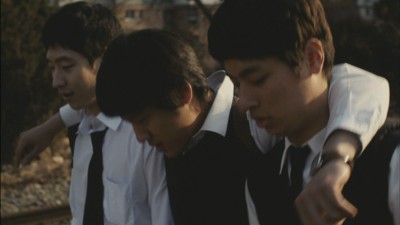
South Korea has, over the last 15 years or so, developed quite the reputation as home to a robust, diverse, and internationally successful national cinema, one that's been consistently topping itself since around the turn of the millennium: From the art-house hits of Ki-duk Kim (3 Iron, Spring, Summer, Fall, Winter...and Spring) to the surprise commercial breakout of eccentric horror/suspensemeister Bong Joon-ho (The Host, Mother) to the more delicately eccentric cinematic sensibilities of Lee Chang-dong (Secret Sunshine, Poetry) to the flat-out modernist sublimity of Hong Sang-soo (Night and Day, The Day He Arrives), that country's once-moribund industry has recovered quite miraculously, exploding in multiple directions to enrich world cinema and gratify cinephiles everywhere. To judge from Yoon Sung-hyun's 2010 film Bleak Night, it would appear that, in the wake of the aforementioned filmmakers' rise to elder-statesman status, there's another South Korean generation being actively cultivated and chomping at the bit to get their own visions onto the screen. Bleak Night is, unlike the vast majority of first features that get distribution beyond their native shores, the direct result of a film-school program, the young Yoon's graduate project for the Korean Academy of Film Arts (KAFA), a facility that -- judging from the well-honed skill and sensitivity at every level (narrative, performance, visual) Yoon has come away with, displaying a remarkable degree of maturity and well-deployed savvy in his first film -- is a fruitful garden that we can expect to contribute a plentiful share to the rich South Korean cinematic harvest. While Bleak Night doesn't quite attain full-masterpiece status, it bears little trace of amateur hesitation or uncertainty; its haunted, haunting tale of a Korean high school student's suicide, his father's pained search for answers, and the gradual revelation of a superficially cocky, brave-faced South Korean youth milieu agonized by its emotional inhibition and repression, achieves, at its best, a depth and nuance of structure, style, and performance that makes it a profoundly engaging, stirring, and disturbing experience.
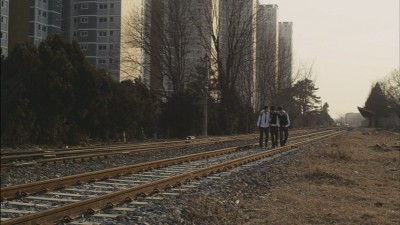
A lot of that comes from Yoon's audacious, well-considered and usually well-realized structure, which gives us the story's present and past running concurrently, bleeding over into each other in ways that investigate and edge ever closer to the emotional core of the story, eliciting our interest and inciting our feeling through payoffs that wouldn't be there were the story delivered in a "straight" chronological way. (It's a device that's been used in art cinema from Hirshoma, mon amour to The Sweet Hereafter, so not an entirely original way of structuring a film, but in this case it's a wise approach, done with enough suppleness and sagacity to truly disorient us and keep us guessing.) The film's first event consists of blurred, out-of-focus, relatively rapidly edited-together handheld shots depicting a vicious beating; its very first image is of an group of high-school boys advancing toward the unfocused camera, already hinting at the film's intriguing, very ambiguous peer-group vs. individual emotional and psychological dynamics. Even after the three high school-age students around whom the story revolves -- Ki-tae (Lee Je-hoon), a charismatic but tortured young man whose arrogant bluff disguises some deep, real adolescent angst; Ki-tae's closest friend, the shy and sensitive Hee-joon/"Becky" (Park Jung-min), whose resentment toward the popular, overconfident-appearing Ki-tae over a perceived slight metastasizes into something positively persecutory; and Dong-yoon (Seo Jun-young), a slightly older, more mature, almost paternal figure ultimately caught between the other two and torn apart by them -- are gradually singled out from the initial uniformed-schoolboy group and individuated, as if focusing in on certain specimens of Korea's troubled youth, there's still ambiguousness to spare regarding what role each has played in the shocking violence we've seen in the opening (or the even harsher consequences yet to be revealed), or when it comes to their real motivations and feelings, which they've learned to keep hidden in a way that is destructive to each other and to themselves. Yoon gathers momentum from what we don't know yet as he takes us, in a chronology we can piece together only tentatively and incompletely right up until near the film's end, through Hee-Joon, Ki-tae, and Dong-yoon's souring friendship, through the good times, the iffy times, and the finally awful times that make up the tragic trajectory of the bond between the three friends as it unravels and snaps in a way they seem collectively powerless to stop. Framing it all is the post-funeral quest of Ki-tae's grieving father (Jo Sung-ha), our stand-in as he struggles to piece together, in at first dodgy and then progressively more intense and revelatory interviews with the now dejected, scattered, and evasive Becky and Dong-yoon, what happened between them, what "caused" his son's suicide.
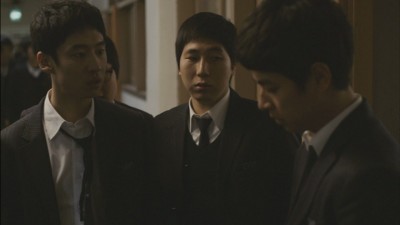
Yoon is smart enough not to offer a definitive answer to the father's (and the film's) central question; like any more sophisticated storyteller, he's not interested in making any simplistic, pat explanations for what went wrong between the three young men (or whatever other, broader societal or gender factors have been at play) to drive Ki-tae to take his own life seem plausible, but rather in vividly limning all the contours of the situation, making it inescapably real to us at the emotional level, giving us much of interest and letting us absorb it and mull for ourselves what the meanings and causes might be. He employs the gorgeously lit hi-def digital videography of his DP, Byon Bong-seon, to play with our physical distance from these characters in a way that parallels the juxtapositions of the chronology: A sense of place, anonymous suburban-high-rise Seoul (one gets the impression that this suburb is interchangeable with others of its kind, and that that's part of the point) is conveyed with very long shots, significantly positioning the three boys/young men in a physical environment and as part of a larger society; this is contrasted with near-cinema vérité style closer-in views whose intimacy is intensified by their shaky-handheld quality (an overused stylistic choice, it often seems, but one made for solid reasons here), while Ki-tae's father's surveillance of the site of his son's death make vertiginously effective use of the well-taken point-of-view shot. Yoon's supple cutting skills (not coincidentally, he has also taken on the film's editing, which goes a long way toward maintaining the integrity of his vision) match his generally acute sensitivity as a director to the pacing of performance and event, his fleetness in transitioning abruptly between past and present sequences that matches his eye for composition of image and camera-movement reframings within each scene; it's a film whose visual choices and tempo and rhythm of montage at once make good narrative sense and, through the well-applied skill at work, offer their own interest and pleasure.
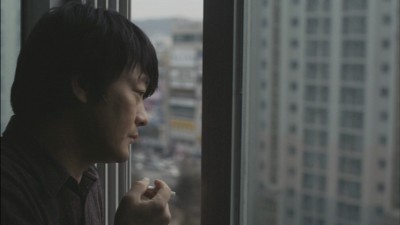
Bleak Night isn't entirely free of flaws that keep it from soaring as high as it might. It probably indulges in one or two more doggedly "dramatic" stand-offs and confrontations than it might actually need, as well as scattered moments that tip slightly into contrivance, over-rely on superficial angst-lite narrative/visual/performative posturing, or fail to give us enough distance from what can occasionally feel like the film's facile recourse to tough-guy clichés (for example, in one exchange, one of the boys mimics almost exactly Joe Pesci's "Am I funny to you? Am I a clown?" routine from Goodfellas, and it plays out in such a way, milked for tension in a close-in handheld style, that we have no idea how seriously to take it, whether Joon means to pass it off as straight action or it's meant to be a comment on pop-culture models that his characters think is cool and worth imitating). A girlfriend's (Lee Cho-hee, whose presence and abilities in her few scenes make you wish you could see more) suicide attempt not only seems like overkill (so to speak) on Yoon's part, but the lack of context leading up to that impression underscores the fact that, despite nice bits of dialogue and performance by his female cast that suggest Yoon might one day have more to give to the stories of girls and women that run concurrent to those of young men, this is a film made by a young guy, almost exclusively about young guys, with little reflection on the experiences of anyone else in their lives or the world around them. But for the most part, these off-key moments fade quickly and seem like anomalous, forgivable rookie mistakes, instances where Yoon has understandably fallen off the high-wire he's chosen and into the safety net of obvious influence and convention. The film much more often stays poised at the heights it aims for, attaining an aura with much more perspective and insight, where the flow of what's unspoken, the lack of tidy clarity when it comes to what's going on within the characters, their true feelings (which Yoon and his cast let us see they're not always entirely clear on, either), in contrast to what they let show, keeps us emotionally and aesthetically intrigued and engaged. Yoon may have been a bit amiss in that recognizably ripped-off bit from Goodfellas, but the Scorsese influences may also have gone deeper and borne riper fruit: Bleak Night is finally like a more introspective, less kinetic (as befits a more formal culture) take on Mean Streets, as much the story of its people's conflicted relationship to their inescapable place and time as to each other -- a tender, sad, intensely cinematic elegy for troubled boys from a troubled social milieu whose tragic destinies we can neither shrug off nor easily explain.
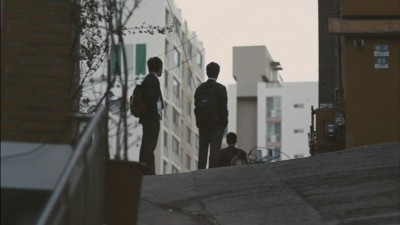
THE DVD:
This anamorphic-widescreen transfer, presenting the film at an aspect ratio of 1.78:1 (not, as slightly incorrectly noted on the box, 1.85:1) is a very faithful rendering of the film's often quite gorgeous high-def digital-video. All the qualities of gray-sky light, muted but variegated colors, and frequent nighttime exterior/dark interior scenes that distinguish Byon Bong-seon's cinematography remain vivid and solid in the DVD presentation, with skin tones looking natural and the intended aesthetics of the film overall remarkably well-preserved, with no aliasing and virtually no edge-enhancement/haloing to be see at any point.
Sound:The Dolby Digital 2.0 soundtrack (in Korean with non-optional English subtitles, either as monochrome or white-yellow to differentiate one character's dialogue from another, as they frequently overlap) is a perfect reproduction of the film's sound, which is mostly dialogue and Foley/background sound, with very sparse music. Everything sounds clear and vibrant, with the only distortion coming apparently from the source recording of several moments of characters shouting that take the sound a little way into the red. That's a minor and rare bit of technical falling-short (one of the film's very few signs of being more or less a student project) that matters little in the long run, and the sound is generally excellent.
Extras:There isn't a whole lot in the way of bonus material on this presentation of Bleak Night. Other than onscreen-text cast/director bios and director's statement, there's just the film's original trailer plus several other previews for 5 Points Pictures releases.
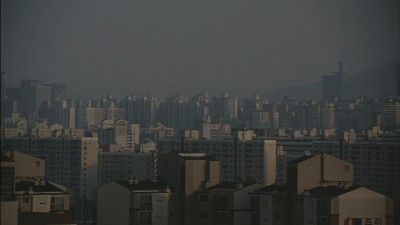
For the most part a dramatically deep and visually beautiful meditation on one young man's tragedy, subtly stretching out to encompass glimpses of universal adolescent ambivalence and discontent as those difficulties manifest in South Korean society, Bleak Night is an impressive first feature (a student film, no less), with writer/director/editor Yoon Sung-hyun putting his finger on the pulse of his nation's youth and giving us a reading that's close, tender, and intimate, yet too observant and possessed of too much perspective and insight to ever become exploitative or sentimental. His very well-cast young actors, mostly virtual unknowns, take bold risks, delving deep and coming up with captivating, sometimes devastating, almost always well-modulated performances, meeting the demands of Yoon's and DP Byon Bong-seon's gorgeously-lit, shallow-focus, more often than not close-up and hand-held visual style, which puts heavier-than-normal demands for restraint, concentration, and commitment on the performers. Yoon structures his story as an investigation of a high-school boy's suicide by his grieving father, with the film's past running parallel with its future, and with certain crucial events withheld as the puzzle falls gradually into place, achieving a quasi-poetic level of realization and release by going back to those pivotal moments at just the right spot for maximum impact, lighting emotional fuses that explode in an overwhelming way once the fuller picture is revealed. It's a high-wire act, attempting to tell this story in a way that fully brings out its intense but murky, indecisive adolescent feeling and ambiguity, and Yoon occasionally stumbles and falls, intermittently breaking Bleak Night's spell with conventional bits of dialogue here or some too-obvious symbolism or strained-for moody tone there. But the film gets back up, dusts itself off, and keeps aiming for narrative and aesthetic heights; on the whole, it's a quietly but hugely ambitious work with quite a surprising ratio of successes to its many cinematic ambitions, and its little missteps are just vestiges of a learning curve its shockingly young director is already many steps ahead of in his development. If Yoon is capable of coming up with something as good, sophisticated, mature, and stylistically well-considered and -realized as Bleak Night under film-school circumstances, and at a period in his life and career where most filmmakers (or artists of any kind) are still unformed and mired deep in the trial-and-error phase of developing their vision and getting it up onto the screen, it makes for a very auspicious beginning for what's sure to be the interesting, potentially great career this intriguing filmmaker has ahead of him. Recommended.
|
| Popular Reviews |
| Sponsored Links |
|
|
| Sponsored Links |
|
|
| Release List | Reviews | Shop | Newsletter | Forum | DVD Giveaways | Blu-Ray | Advertise |
|
Copyright 2024 DVDTalk.com All Rights Reserved. Legal Info, Privacy Policy, Terms of Use,
Manage Preferences,
Your Privacy Choices | |||||||














